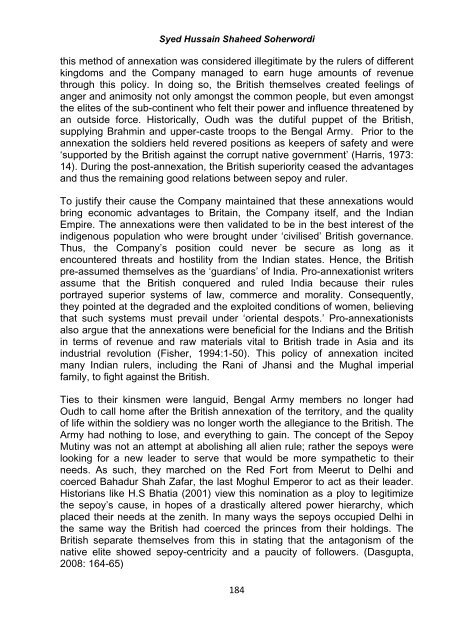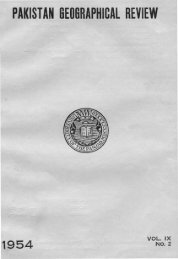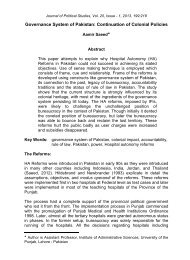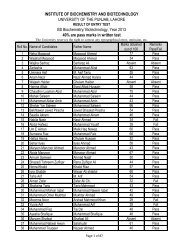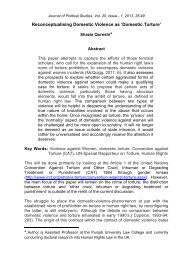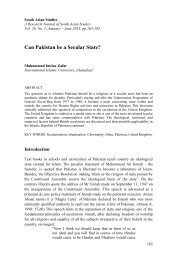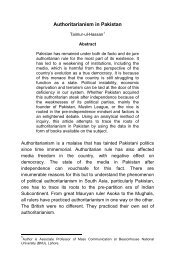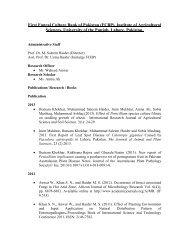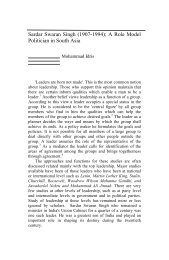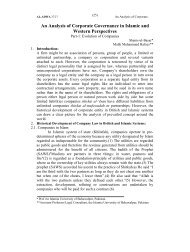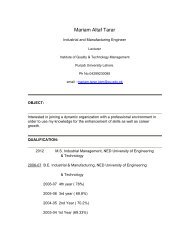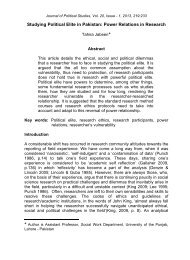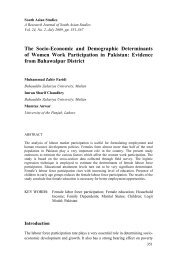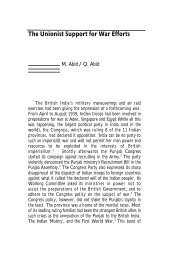The Significance of the Different Names Applied by Historians to the ...
The Significance of the Different Names Applied by Historians to the ...
The Significance of the Different Names Applied by Historians to the ...
You also want an ePaper? Increase the reach of your titles
YUMPU automatically turns print PDFs into web optimized ePapers that Google loves.
Syed Hussain Shaheed Soherwordi<br />
this method <strong>of</strong> annexation was considered illegitimate <strong>by</strong> <strong>the</strong> rulers <strong>of</strong> different<br />
kingdoms and <strong>the</strong> Company managed <strong>to</strong> earn huge amounts <strong>of</strong> revenue<br />
through this policy. In doing so, <strong>the</strong> British <strong>the</strong>mselves created feelings <strong>of</strong><br />
anger and animosity not only amongst <strong>the</strong> common people, but even amongst<br />
<strong>the</strong> elites <strong>of</strong> <strong>the</strong> sub-continent who felt <strong>the</strong>ir power and influence threatened <strong>by</strong><br />
an outside force. His<strong>to</strong>rically, Oudh was <strong>the</strong> dutiful puppet <strong>of</strong> <strong>the</strong> British,<br />
supplying Brahmin and upper-caste troops <strong>to</strong> <strong>the</strong> Bengal Army. Prior <strong>to</strong> <strong>the</strong><br />
annexation <strong>the</strong> soldiers held revered positions as keepers <strong>of</strong> safety and were<br />
‘supported <strong>by</strong> <strong>the</strong> British against <strong>the</strong> corrupt native government’ (Harris, 1973:<br />
14). During <strong>the</strong> post-annexation, <strong>the</strong> British superiority ceased <strong>the</strong> advantages<br />
and thus <strong>the</strong> remaining good relations between sepoy and ruler.<br />
To justify <strong>the</strong>ir cause <strong>the</strong> Company maintained that <strong>the</strong>se annexations would<br />
bring economic advantages <strong>to</strong> Britain, <strong>the</strong> Company itself, and <strong>the</strong> Indian<br />
Empire. <strong>The</strong> annexations were <strong>the</strong>n validated <strong>to</strong> be in <strong>the</strong> best interest <strong>of</strong> <strong>the</strong><br />
indigenous population who were brought under ‘civilised’ British governance.<br />
Thus, <strong>the</strong> Company’s position could never be secure as long as it<br />
encountered threats and hostility from <strong>the</strong> Indian states. Hence, <strong>the</strong> British<br />
pre-assumed <strong>the</strong>mselves as <strong>the</strong> ‘guardians’ <strong>of</strong> India. Pro-annexationist writers<br />
assume that <strong>the</strong> British conquered and ruled India because <strong>the</strong>ir rules<br />
portrayed superior systems <strong>of</strong> law, commerce and morality. Consequently,<br />
<strong>the</strong>y pointed at <strong>the</strong> degraded and <strong>the</strong> exploited conditions <strong>of</strong> women, believing<br />
that such systems must prevail under ‘oriental despots.’ Pro-annexationists<br />
also argue that <strong>the</strong> annexations were beneficial for <strong>the</strong> Indians and <strong>the</strong> British<br />
in terms <strong>of</strong> revenue and raw materials vital <strong>to</strong> British trade in Asia and its<br />
industrial revolution (Fisher, 1994:1-50). This policy <strong>of</strong> annexation incited<br />
many Indian rulers, including <strong>the</strong> Rani <strong>of</strong> Jhansi and <strong>the</strong> Mughal imperial<br />
family, <strong>to</strong> fight against <strong>the</strong> British.<br />
Ties <strong>to</strong> <strong>the</strong>ir kinsmen were languid, Bengal Army members no longer had<br />
Oudh <strong>to</strong> call home after <strong>the</strong> British annexation <strong>of</strong> <strong>the</strong> terri<strong>to</strong>ry, and <strong>the</strong> quality<br />
<strong>of</strong> life within <strong>the</strong> soldiery was no longer worth <strong>the</strong> allegiance <strong>to</strong> <strong>the</strong> British. <strong>The</strong><br />
Army had nothing <strong>to</strong> lose, and everything <strong>to</strong> gain. <strong>The</strong> concept <strong>of</strong> <strong>the</strong> Sepoy<br />
Mutiny was not an attempt at abolishing all alien rule; ra<strong>the</strong>r <strong>the</strong> sepoys were<br />
looking for a new leader <strong>to</strong> serve that would be more sympa<strong>the</strong>tic <strong>to</strong> <strong>the</strong>ir<br />
needs. As such, <strong>the</strong>y marched on <strong>the</strong> Red Fort from Meerut <strong>to</strong> Delhi and<br />
coerced Bahadur Shah Zafar, <strong>the</strong> last Moghul Emperor <strong>to</strong> act as <strong>the</strong>ir leader.<br />
<strong>His<strong>to</strong>rians</strong> like H.S Bhatia (2001) view this nomination as a ploy <strong>to</strong> legitimize<br />
<strong>the</strong> sepoy’s cause, in hopes <strong>of</strong> a drastically altered power hierarchy, which<br />
placed <strong>the</strong>ir needs at <strong>the</strong> zenith. In many ways <strong>the</strong> sepoys occupied Delhi in<br />
<strong>the</strong> same way <strong>the</strong> British had coerced <strong>the</strong> princes from <strong>the</strong>ir holdings. <strong>The</strong><br />
British separate <strong>the</strong>mselves from this in stating that <strong>the</strong> antagonism <strong>of</strong> <strong>the</strong><br />
native elite showed sepoy-centricity and a paucity <strong>of</strong> followers. (Dasgupta,<br />
2008: 164-65)<br />
184


